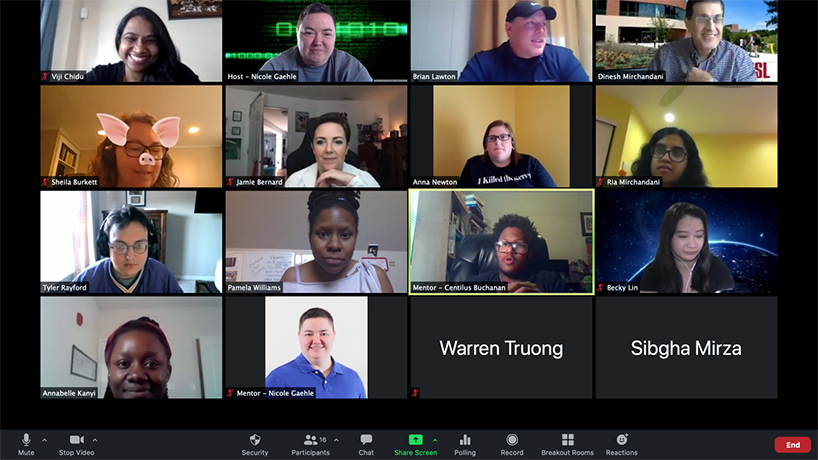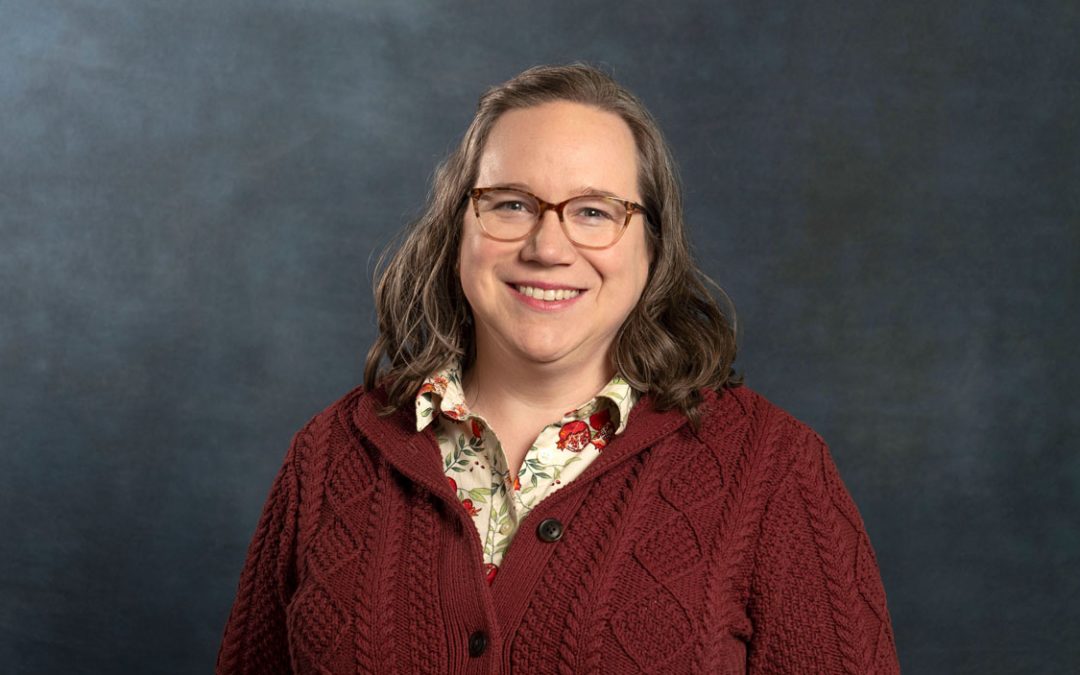
The theme for the Women’s Hackathon this year was COVID-19. Participants were faced with the task of creating a solution for challenges brought on by the pandemic related to health care industry, travel/hospitality industry, community or free style. (Photo courtesy of Nicole Gaehle)
By Sarah Thomas
Pamela Williams had no idea that her nightmare experience of waiting nearly a half hour in the rain to enter Costco this past summer would pay off with something other than frustration.
That was before the College of Education graduate student had ever heard about the University of Missouri–St. Louis Women’s Hackathon, so no one was more surprised than Williams that she was able to transform that experience into a strong idea for the event.
It was so strong that her team placed first.
“I found out about the Hackathon through an email,” she said, explaining she’d had no coding background. “I’ve been wanting to get more involved on campus, so when I read that no experience was necessary, I thought, ‘Why not?’ and signed up for it.”
Hackathons are day- or weekend-long events where team members put their heads together to solve a problem quickly. Aside from Williams, the first-place team included UMSL students Warren Truong, Sibgha Mirza and Cynthia Whitney.
The theme for the Hackathon this year was COVID-19. The two participating teams were faced with the task of creating a solution for challenges due to COVID-19. The teams could choose between the health care industry, travel/hospitality industry, community or free style.
The Women’s Hackathon took place Nov. 14-15 and looked a little different from prior years. Nicole Gaehle, an information systems graduate student and organizer of the event, made the decision to host the Hackathon virtually and with more than 20 additional hours.
“For the first time ever, our Hackathon is lasting more than eight hours,” Gaehle said. “It was held from 8 a.m. on the 14th until 3 p.m. on the 15th with it being virtual for the whole 30-plus hours.”
In previous years, the Hackathon was an eight-hour daytime event that took place in person. This year the teams were able to work around the clock on their solution.
Participants often had drawn inspiration from their life experiences, as Williams did.
“I shared with my team that while waiting in that line at Costco, I remember saying to my daughter that I would have paid money to know I could have gotten into the store at a specific time,” Williams said. “I told them that long lines might be a good problem for us to solve for businesses because it could help a lot of small business that are closing down or drastically reducing their staff because they can’t guarantee sales.”
Williams’ idea resonated with her team members, so they decided to create a web application called WindowShopping. Window Shopping allows users to book time slots to guarantee an entry time to enter a store at a low cost. The cost of the time slot would then be put towards a purchase at the store.
“Our team built WindowShopping to help get people in and out of stores quickly and reduce exposure to others,” Truong explained. “WindowShopping will reduce wait times and lines outside stores.”
The team worked tirelessly to bring their idea to life in the 30-plus-hour time period they were given.
“I remember getting an email from Warren and Sibgha around 1 a.m. and admiring their hard work,” Williams said.
The idea struck a chord with the judges and wound up winning the team first place.
“It was exciting to win first place and overall a great learning experience,” Mirza said. “Working with a team to build the web app was very fun whether we won or not.”
While the team was excited to win first place, they seemed to be more grateful for the process. Truong decided to participate to gain experience in his field as a computer science major.
“I had some experience with coding before from my computer science classes,” Truong said. “When I heard about the Hackathon, I thought it would give me a great opportunity to connect with people from the technology field and give me experience to build a product.
“I’m glad I did. The Hackathon is a great networking and coding event. It helped me learn more about technology products, business models and how to use technology to solve social problems. I also had a chance to meet innovative and passionate people.”
The Women’s Hackathon was able to safely accomplish its mission of bringing students together to create innovative ideas despite the challenges presented from the coronavirus pandemic.
“This year wound up being a great experience virtually for everyone,” Gaehle said. “It’s great to know that going forward it can be pulled off in a virtual format.”














